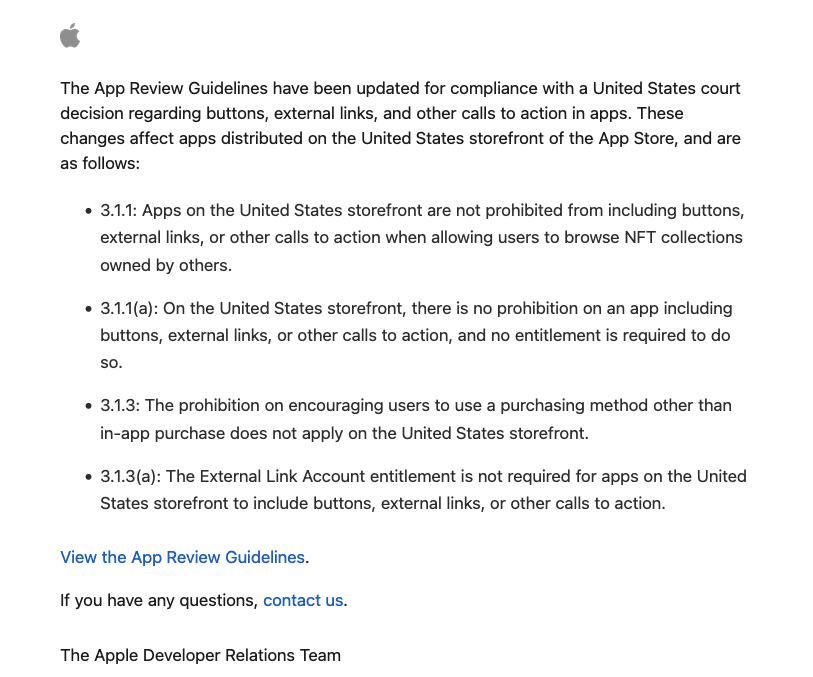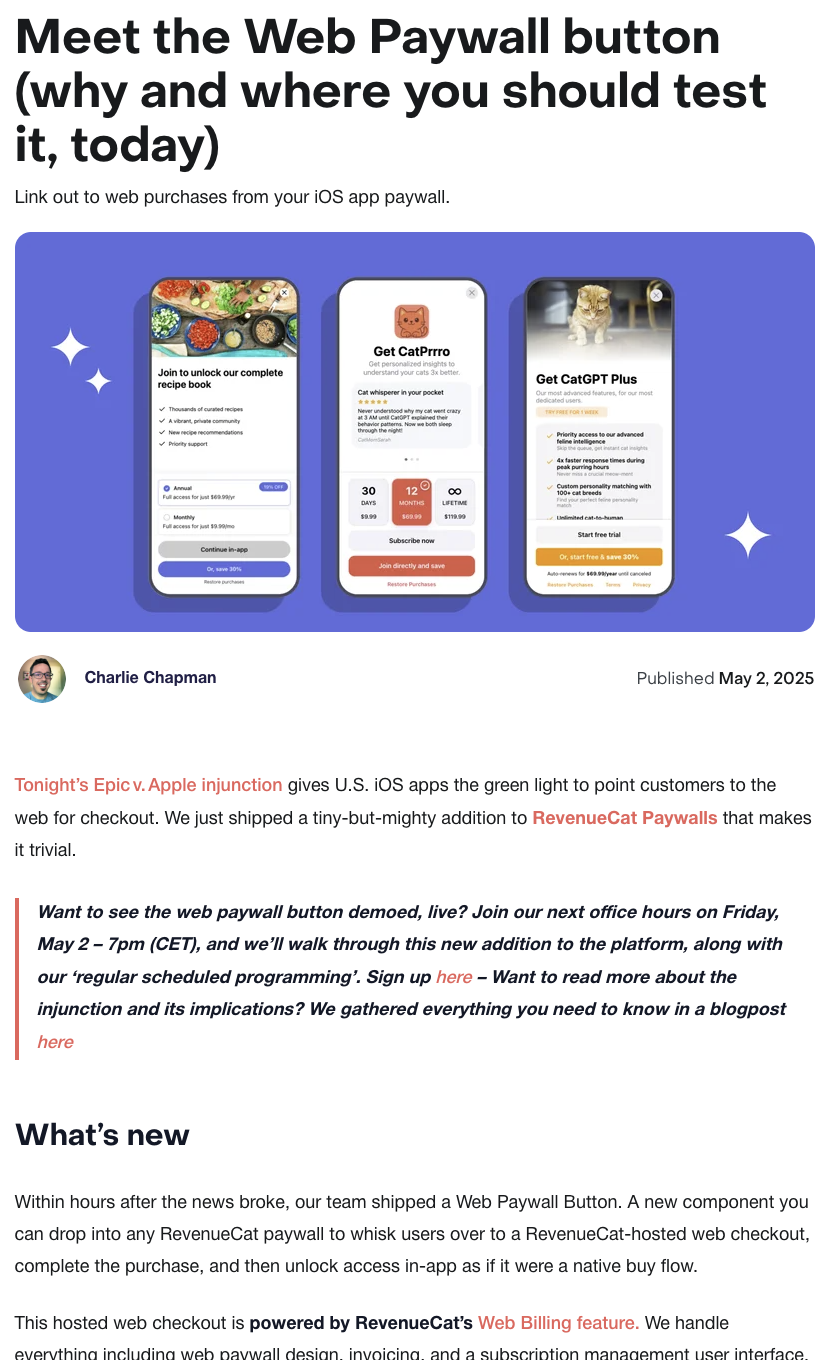Apple lost to Epic Games: What’s next for mobile products?
The long-running legal dispute between Apple and Epic Games finally reached a conclusion last Wednesday when Judge Yvonne Gonzalez Rogers ruled that Apple is no longer able to:
- Charge its provision fees outside of the App Store
- Prevent developers from redirecting users to external payment methods [instead of making a transaction via the App Store]
From now on, app developers can avoid the 30 percent cut Apple takes from most transactions and opt to process payments on their own.
This is a big change that’ll impact both mobile product managers and consumers.
History of Apple vs. Epic Games
To help you better understand the impact of this dispute, let’s take a look at how we got to where we are today.
August 2020: Dispute starts
Epic Games, the creator of the viral game Fortnite, released a new app update that intentionally violated Apple’s and Google’s store policies, which forced app developers to use in-store payment processing options (that pocket up to a 30 percent commission).
Even more than that, Epic Games encouraged users to use the external payment method by offering them a discount.
This caused Apple and Google to quickly remove Fortnite from app stores. However, this was a planned and intended provocation by Epic Games. On the same day, it filed a lawsuit against Apple on 10 counts:
- Violation of the Sherman Act — Alleging that Apple’s practices constituted a monopoly
- Violation of the California Unfair Competition Law — Claiming that Apple’s anti-steering provisions were unfair and anticompetitive
- Breach of contract — Asserting that Apple’s removal of Fortnite from the App Store breached the developer agreement
- Declaratory relief — Seeking a court declaration that Apple’s App Store policies were unlawful
- Injunctive relief — Requesting an injunction to prevent Apple from enforcing certain App Store policies
- Unjust enrichment — Arguing that Apple was unjustly enriched by its 30 percent commission on in-app purchases
- Tortious interference with contractual relations — Claiming that Apple’s actions interfered with Epic’s relationships with its customers
- Tortious interference with prospective economic advantage — Alleging that Apple’s conduct disrupted Epic’s potential future business opportunities
- Conversion — Asserting that Apple wrongfully exercised control over Epic’s property, namely its app and customer relationships
- Violation of the Cartwright Act — Claiming that Apple’s practices violated California’s antitrust law
September 2022: First ruling
The Federal Court ruled in favor of Apple on nine out of ten counts. However, it ruled in favor of Epic Games on:
- Violation of the California Unfair Competition Law — Claiming that Apple’s anti-steering provisions were unfair and anticompetitive
Neither Apple nor Epic Games was fully satisfied with the ruling, so both parties filed appeals.
April 2023: Second ruling
After years of further legal conflict, the Court of Appeals validated the original outcome, favoring Apple on most counts but claiming that Apple did indeed violate California law.
Both parties filed further appeals to the Supreme Court.
January 2024: Appeal denied and App Store terms change
The Supreme Court declined to hear the further appeal, validating previous rulings.
The first legal dispute ended and forced Apple to update its App Store terms, allowing developers to add third-party payment methods to their apps.
However, not only did adding an alternative payment method require additional permission, but Apple still claimed a 27 percent commission on any transactions made, even outside the app store.
March 2024: Second dispute starts
Epic Games didn’t like the fact that Apple still claimed a commission on the transactions. It claimed that Apple didn’t fully respect the Court decision and broke further laws.
The lawsuit was met with strong support from big tech companies such as Meta, Microsoft, and X.
April 2025: Final(?) ruling
After investigating this topic, Judge Yvonne Gonzalez Rogers ruled that Apple intentionally violated the Court’s initial decision, and ruled that Apple must immediately cease collecting commission on transactions conducted outside of the App Store and allow adding alternative payment methods without restrictions:
Apple updated its Review Guidelines based on the court ruling.
Market reaction
Various platforms that facilitate payment processing via the App Store, such as RevenueCat, immediately reacted by launching and promoting new capabilities that allow for easy integration of alternative payment methods in the app:
Now it seems like only a matter of time until big players start experimenting with alternative payment methods.
What about Google?
While Epic Games versus Apple has had more eyes on it — mostly because in the US, iOS devices constitute the majority of mobile apps revenue — Epic Games also filed a lawsuit against Google.
The initial verdict on 11 December 2023 ruled in favour of Epic Games. Google appealed the verdict and has been able to maintain its current practices (that is, no alternative payment methods) until the verdict is resolved.
The case isn’t fully resolved as of today, however, given the Apple versus Epic Games ruling and the law of precedent, it’s very likely that the final decision will be similar.
Impact on mobile app monetization
The ruling opens a new way to monetize mobile products. Now, app developers have three options:
- Keep using built-in app store purchases
- Use an alternative payment method
- Support both methods
Benefits of alternative payment methods
The biggest advantage of using alternative payment methods (e.g., redirecting users to an external payment form, collecting CC details individually, etc.) is the omission of 30 percent commission from Apple. Although other payment methods do have provision systems, they’re significantly lower than Apple’s cut.
Furthermore, it gives developers more control over the data they collect and how they handle payments and premium access control.
For example, instead of relying on Apple’s built in “introductory offer” rules, app developers can exercise more control over what type of user gets what type of price, offer, and terms.
Benefits of an app-store purchase
App Store purchases still have their benefits. Letting Apple handle everything related to payment and subscription management is more straightforward than integrating and controlling your own payment and subscription management platform.
The user experience is also more seamless, often allowing users to finish the payment process in two quick steps by using billing details already assigned to App Store accounts.
New opportunities for mobile product managers
Whether you should keep using Apple’s payment processing or add alternative payment methods depends on your particular context and capabilities.
However, one thing’s for sure: You have more options for handling payments and subscription management.
Now, you can experiment with different setups (Apple only, alternatives only, or a mix of both) to find the best fit for you. Are you better off with the seamless and easy experience of Apple’s App Store purchases, or are you better off with a higher-friction experience that results in more control and fewer processing fees?
It’s a mix of strategic decisions and experimentation to see what works for you best, but products that have an audience who are willing to go a few extra steps can greatly increase their margins by not paying the very high commissions Apple takes.
Apple’s next move?
Although further appeals would be difficult at this point, it doesn’t mean Apple is going to drop this topic.
If a substantial portion of mobile app developers start moving users to alternative payment methods (by using discounts and other special offers), Apple might be forced to review its monetization strategy and the percent commission it charges to remain a viable and competitive option.
One thing is certain — Apple’s strong grip on the US mobile apps market has significantly weakened. A more competitive environment will likely push Apple to employ new strategies to keep making its buck on App Store products.
Featured image source: IconScout
The post Apple lost to Epic Games: What’s next for mobile products? appeared first on LogRocket Blog.
This post first appeared on Read More




